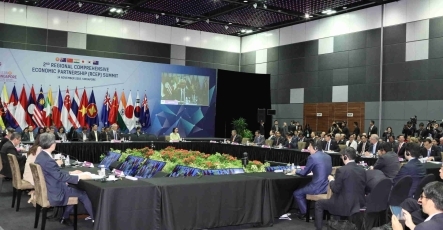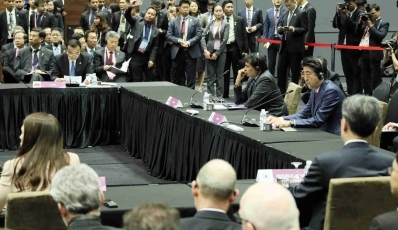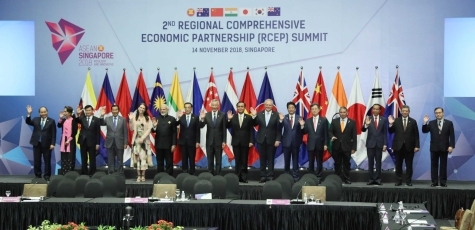Free Trade Agreement (FTA) and Economic Partnership Agreement (EPA)
Regional Comprehensive Economic Partnership (RCEP) Summit
November 14, 2018
 Photograph of the Prime Minister making a statement at the RCEP Summit
(Photo: Cabinet Public Relations Office)
Photograph of the Prime Minister making a statement at the RCEP Summit
(Photo: Cabinet Public Relations Office)
 Photograph of the Prime Minister making a statement at the RCEP Summit
(Photo: Cabinet Public Relations Office)
Photograph of the Prime Minister making a statement at the RCEP Summit
(Photo: Cabinet Public Relations Office)
 Photograph of the Prime Minister attending a photograph session at the RCEP Summit
(Photo: Cabinet Public Relations Office)
Photograph of the Prime Minister attending a photograph session at the RCEP Summit
(Photo: Cabinet Public Relations Office)
On November 14, Prime Minister Shinzo Abe, visiting Singapore to attend the ASEAN-related Summit Meetings, participated in the Regional Comprehensive Economic Partnership (RCEP) Summit, attended by the 16 countries participating in the RCEP negotiations. The overview of the Summit is as follows.
- At the outset, H.E. Mr Lee Hsien Loong, Prime Minister of the Republic of Singapore, serving as the Chair, stated that amid rising anti-globalization sentiments, the importance of the RCEP is growing, and that since the RCEP negotiations have made substantial progress in 2018 and have entered the final stage, the negotiations are ready to be concluded in 2019.
-
- (1) In his statement, Prime Minister Abe expressed his gratitude for the initiatives of Prime Minister Lee as the Chair. Furthermore, he welcomed the "substantial progress" and supported the Joint Leaders' Statement. In addition, he stated that, in the context of rising protectionist sentiments, the strategic importance of the RCEP is further growing, and that a free, fair and rule-based market should be established for the realization of the free and open Indo-Pacific.
- (2) Furthermore, noting that Japan had led the negotiations of TPP11 and that it will enter into force within this year, he emphasized the importance of the swift conclusion of a high-quality RCEP agreement, on the grounds that substantially reducing tariffs and invigorating exchanges of people, goods, and capital are extremely important. In addition, he pointed out that it is necessary to develop an environment where companies and individuals can do business without undue worries. In order to achieve this, he stated that it is necessary to protect intellectual property, to develop an environment where companies and consumers can engage in electronic commerce safely and freely and can compete fairly, and to improve customs procedures for the facilitation of trade. The Prime Minister stated that Japan would exert strong leadership to make the entire RCEP economic zone a base for innovation and to establish economic rules in the new era.
- (3) He went on to state that under the leadership of the 16 RCEP participating countries, an inclusive RCEP, which pushes the economic level of each country to the next stage and brings benefits to all people, should be realized. With that in mind, he stated that Japan is determined to continue playing a leading role in achieving the swift conclusion of the RCEP negotiations in 2019, in cooperation with Thailand, next year's Chair.
- Statements such as the following were made by the other attendees.
- We are grateful for the leadership of Singapore, this year's ASEAN Chair
 . The RCEP negotiations have made dramatic progress in 2018.
. The RCEP negotiations have made dramatic progress in 2018. - Amid rising protectionist sentiments and other movements, committing to conclusion of the RCEP in 2019 is vitally important.
- The RCEP will contribute not only to further economic development but also to the elimination of poverty in the Indo-Pacific region, the growth center of the world economy (Japanese / English).
- The RCEP should deal with trade in services and contemporary issues such as the digital economy.
- An inclusive, high-quality, and commercially meaningful RCEP should be pursued.
- Flexibility should be demonstrated while taking into consideration the diverse development stages and sensitivities of the countries participating in the RCEP negotiations.
- We are grateful for the leadership of Singapore, this year's ASEAN Chair
- After the meeting, the Joint Leaders' Statement on the RCEP Negotiations (PDF)
 was issued.
was issued.
[Reference] Countries participating in the RCEP negotiations: the 10 ASEAN countries (Brunei, Cambodia, Indonesia, Lao PDR, Malaysia, Myanmar, Philippines, Singapore, Thailand, Viet Nam), Australia, China, India, Japan, the Republic of Korea, and New Zealand


 (Open a New Window)
(Open a New Window)